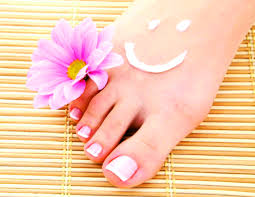So what is it that causes smelly feet? Malodor of the feet begins with sweating, which provides a good environment for bacteria. This may happen to everyone from time to time, but chronic or severe odor of the feet may be associated with a medical condition known as plantar hyperhidrosis, or excessive sweating of the feet. Mildly, it may just be embarrassing, but in severe cases, excessive sweating may become such an issue that it interferes with daily living.
The cause of excessive sweating is not clearly known but is thought to be hereditary. Most people begin to perspire due to overheating from lack of “breathable” socks and shoes, or from warm weather conditions. However, the patient who suffers from hyperhidrosis may sweat persistently, even in cooler temperatures. Constant moisture can also lead to bacterial and fungal infections.
Daily foot hygiene is extremely important. For those who perspire excessively, it is even more important to make sure socks and shoes are changed regularly. As I mentioned in a previous blog, pure cotton socks actually trap moisture and should be avoided, as do nylons. Moisture wicking athletic socks work well, and may be made of a cotton-synthetic blend. Airing out feet whenever possible is also helpful. Also, avoid shoes made of synthetic non-breathable materials as well.
One home remedy is to try caffeinated (black) tea soaks. The caffeine and tannins in tea have been found to help prevent the sweat glands from over-producing. Daily soaks are recommended in order for this to be effective.
Prescriptive medications are available for treatment. A simple trick, however, is to get an over-the-counter antiperspirant spray. This can be used daily before putting on footwear. If over the counter products are not strong enough, prescriptive sprays are also available. Remember to dry feet and between toes after showering.
Another treatment is a technique called iontophoresis. This is a treatment which uses water to conduct a mild electrical current through the skin. Studies have shown this method to be effective if repeated a few times a week. People can buy iontophoresis machines for at-home use.
For very severe cases, Botox injections are becoming more widely used, though they are not yet FDA approved for plantar hyperhidrosis. In such cases, Botox is injected into the feet in the doctor’s office under local anesthesia. The toxin in Botox works by temporarily blocking the neurotransmitters that stimulate glands to produce sweat. Since the toxin is eventually degraded in the body, this treatment has to be repeated and can last about 3-4 months.
Other factors leading to excessive sweating can also be diet or stress related. If you suspect you have hyperhidrosis, it is best to seek medical advice. Your doctor will determine the underlying cause and choose a treatment best for you.

